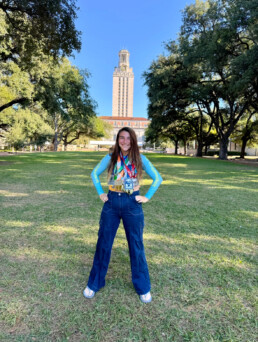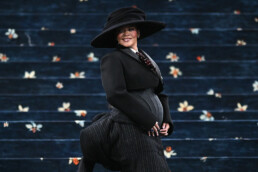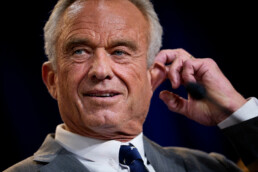Doctors Finally Admit IUDs Hurt
 May 21, 2025 Greetings, Meteor readers, Last Friday, I had the immense pleasure of seeing Real Women Have Curves on Broadway. In a world where people are being violently rounded up and inhumanely detained, it was reinvigorating to watch a story so steeped in Latinx culture and the resilience of immigrant women. I laughed, I cried, I developed a crush on Claudia Mulet, and I vowed to be louder about the injustices of our anti-immigrant regime.  IF ALL THESE WOMEN DON'T GET TONYS, I WILL RIOT IN THE STREETS. (VIA GETTY IMAGES) In today’s non-musical-theater news, we explain the latest “discovery” about IUD insertion. Plus, a new law banning revenge porn is finally on the books. No soy de aquí, pero tu tampoco, Shannon Melero  WHAT'S GOING ONBetter late than never: The American College of Obstetricians and Gynecologists (ACOG) has released new recommendations around cervical and uterine procedures, most notably IUD insertion. On the heels of similar guidance released by the CDC last year, ACOG has discovered not only that IUD insertion can be excruciatingly painful to patients, but that there is an “urgent need” for clinicians to offer pain management. Sorta like when Columbus discovered America. And by that, I mean many of us were already here. Women have been complaining about the pain caused by IUD insertions for years, and the people doing the inserting famously underestimate it; one study from 2014 found that while doctors were rating the pain of IUD insertion a 35 out of 100, patients ranked it at more like 65. This probably comes as no surprise to anyone who has either visited a gynecologist or been on the internet: Women’s pain, particularly around reproductive health, is often dismissed as either exaggerated or simply part and parcel of ✨being a woman✨. Think Serena Williams nearly dying in childbirth after her pain was ignored, or the women at the Yale fertility clinic who were unwittingly undergoing egg retrievals without pain relief and told their agony was normal. Unlike the CDC recommendation, ACOG also recommends pain management for a variety of procedures like endometrial biopsy, polypectomy, hysteroscopy, and certain kinds of imaging. And ACOG acknowledges structural inequities: “The way pain is understood and managed by health-care professionals is also affected by systemic racism and bias of how pain is experienced,” its findings note. “Historically, Black patients have received less analgesics than white patients, and women have received less attention to their pain than men undergoing similar procedures.” This change, of course, does not guarantee painless IUD insertions; there’s only so much lidocaine can do. But the guidance is important because it encourages doctors to have conversations they might have once deemed unnecessary, including ones around anxiety that patients might feel about undergoing some procedures (anxiety which ACOG suggests can be addressed with medication). As someone who was prescribed Xanax to make it through a dental procedure, I think it’s wild that stronger medications aren’t regularly offered when someone burrows a medical device up your cervix. So if you’ve got an appointment coming up, be vocal! We’ve already suffered enough–we deserve the good drugs. AND:
 REGINA VENTURA OUTSIDE OF THE COURTHOUSE. (GETTY IMAGES)
 CLARK AND REESE MEETING AT MID-COURT AHEAD OF THE GAME AND THE FOUL HEARD ROUND THE WORLD. (VIA GETTY IMAGES)
 FOLLOW THE METEOR Thank you for reading The Meteor! Got this from a friend?
|
![]()
Running, Walking, Crawling for Justice
 May 15, 2025 Greetings, Meteor readers, I had a delightful and tear-inducing conversation with a young woman today (read some of it below) that reminded me just how much many of us suffer in silence. If that’s you, please know: We hear you even if you’re whispering. In today’s newsletter, the clock is counting down on the Summer Willis Act, a Texas bill that could reshape the future for sexual assault survivors. Plus, a heartbreaking case in Georgia and your weekend reading list. For the quiet ones, Shannon Melero  WHAT'S GOING ONCodifying consent: In just about two weeks, the 89th Texas legislature will adjourn and will not return until January of 2027, meaning that any bills that aren’t voted on during this session will remain in limbo for two years. For Summer Willis–a Texas mom of two, endurance athlete, and fierce advocate for an anti-rape bill making its way through the State Senate–that’s two years too long. You may have heard of Summer Willis: She ran the course of the New York City marathon (on International Women’s Day) last year while carrying a mattress to raise awareness about sexual abuse. For her, it was personal: When Willis was a sophomore at University of Texas-Austin in 2014, she says, she was drugged and raped at a frat party. She didn’t go to the police or school at the time. But later, she learned that what had happened to her was not even classified as rape because of the murkiness of Texas’s sexual assault law. Because one person had given her a spiked drink and a different man raped her, she says, the latter could not be tried since he didn’t “voluntarily intoxicate” her. The lack of legal clarity around consent means that many assaults, especially ones committed on college campuses, effectively disappear. “My rape is not considered rape in Texas right now,” Willis says. “Neither are the [rapes of] thousands of Texans.” She tried to bury the trauma until two years ago, shortly after the birth of her second child. In the thick of postpartum, she says she looked her boys in the eyes and said, “I promise y'all I will try to become the woman I used to believe I could be.” She took up running, believing that it would “make me strong and resilient and find all the answers I’ve been seeking for 10 years.” When she began sharing her story of survival with other runners and moms, she was shocked by how many of them relayed similar stories. “I was never planning on being an advocate,” she says. “But I just met too many survivors.”  WILLIS CROSSING TOWER BRIDGE AT THE LONDON MARATHON, WITH MORE JOY THAN ANYONE WOULD EXPECT FROM SOMEONE DOING THIS MUCH RUNNING. SUPER HUMAN. (COURTESY OF SUMMER WILLIS) In February, Willis crawled half the distance of the Austin Marathon and ran the rest, the starting point of her run just across the street from where she was assaulted. (She told Runner’s World that the crawl was a metaphor for the difficulty survivors face in the search for justice.) Afterward, HB 3073’s sponsors informed Willis they would be renaming the bill in her honor. If passed, the law would codify and provide a legal definition of consent, including a stipulation that there can be no consent if a victim is intoxicated or unaware an assault is happening. “I feel the weight of all survivors in Texas on my shoulders,” she says. Although Willis thinks simply defining consent is “not enough,” the bill “will finally tell so many survivors that their rape counts.” Although HB 3073 passed the House earlier this month with overwhelming bipartisan support and is (shockingly) a top priority of Texas Governor Greg Abbott’s sexual assault task force, the clock is ticking before the legislative session ends on June 2. So what can we do? Texans can contact their senators, and Willis says the two men who need to really feel the love for this bill are Mike Ward (R-TX) and Pete Flores (R-TX). You can also find resources and follow Willis’ work by supporting her organization, Strength Through Strides. AND:
  WEEKEND READING 📚On going when you need to: One trans man spent a lifetime avoiding public bathrooms, damaging his bladder in the process. But now he’s finally ready to stop holding it all in. (Cosmopolitan) On the “magic pill”: For some–especially pregnant people–the anti-nausea medication Zofran is a lifesaver. So why isn’t this safe, quick, effective drug sold over the counter? (The Cut) On inherited worries: “At thirty-six, I have never been sweeter, smarter, or hotter than I am now.” Angelica Jade Bastién has a message for women already flagellating themselves over aging. (Madwomen & Muses)  FOLLOW THE METEOR Thank you for reading The Meteor! Got this from a friend?
|
![]()
Moms Don't Need Jobs, Right?
 May 13, 2025 Hey there, Meteor readers, I don’t know about the rest of y’all New Yorkers, but it has been extremely tense in my house as the Knicks take my entire family on an emotional journey through the playoffs. Peace be with the fans.  YOU JUST KNOW THIS MAN'S BLOOD PRESSURE IS OFF THE CHARTS. (VIA GETTY IMAGES) In today’s newsletter, we’re taking a look at the GOP's obsession with stay-at-home moms. Plus, three questions on wellness with writer Amy Larocca. Knicks in five, Shannon Melero  WHAT'S GOING ONFrom WAHM to SAHM: Last month, we wrote about Trump’s pro-natalist plans to solve the declining birth rate in the U.S., which pretty much added up to, Here’s a little extra money and a medal, have some more kids. No, thanks! But, not one to let a bad idea go, the GOP is tackling the issue from an incredibly old angle: encouraging more stay-at-home parents (more than 80 percent of whom are moms). Instead of investing in federally funded childcare, the administration has proposed cuts to Head Start and fired hundreds of workers at the offices of Child Support Services, Child Care, and Family Assistance. Conservatives claim these moves don’t contradict their natalist stance; they merely want to encourage parents to spend more time with their children. Republicans in Congress have proposed expanding child tax credits to help parents afford to stay home, eliminating daycare tax breaks, and offering new credits to families that use relatives as caregivers—all solutions designed to, as Sen. Josh Hawley (R-MO) put it to the New York Times, “give parents the opportunity to…actually raise [their] kids.” So what’s wrong with that? First, Hawley’s assertion that parents who send their children to daycare are not actually raising them would be laughable if it weren’t so infuriating. Daycare employees are providing a structural and educational foundation for children that, frankly, many parents don’t feel equipped to offer, even if they were given a $5,000 tax credit. Would that money go a long way toward helping some families? Absolutely. Would it be enough to allow one parent to quit their job? No, and I cannot emphasize this enough, fucking way. And then there’s the basic assumption underlying these policies: that, as conservatives have argued for years, children who stay home with mom flourish more than those who do not. There is no definitive study that proves that to be the case; other factors like poverty and food insecurity are far more relevant to whether kids will thrive. The fact that Republicans aren’t even pretending to address those factors is incredibly telling. They aren’t interested in supporting families’ childcare choices. They’re certainly not interested in making sure impoverished children have access to resources. But they are interested in pressuring mothers–especially ones who can afford it, with or without a tax credit–to get out of the office and go back to being barefoot and pregnant. AND:
 ÖZTÜRK AT A PRESS CONFERENCE FOLLOWING HER RELEASE. (VIA GETTY IMAGES)
 YOU CAN VISIT "GROUNDED IN THE STARS" THROUGH JUNE 17. (GETTY IMAGES)  Three Questions About...WellnessAmy Larocca, author of a big new book on the industry, separates the harmless from the hoaxesBy Cindi Leive  AMY LAROCCA (COURTESY OF PENGUIN RANDOM HOUSE) One of the many developments of the last decade—along with the rise of AI, Trumpism and tradwives—is the vast and varied world known as “wellness,” which includes everything from that meditation app on your phone to billion-dollar biohacking. Journalist Amy Larocca has spent seven years making sense of it all, and her book, How to Be Well: Navigating our Self-Care Epidemic, One Dubious Cure at a Time, is out today. Despite its skeptical subtitle, Larocca understands that “wellness culture is too big for us to be either completely for or against it.” So where did she land? I wanted to know. Your book investigates the recent rise of wellness culture. But back in the ‘80s, there were grapefruit diets and aerobics classes and all kinds of physical expectations. What’s different now? A lot of it in the ‘80s was about looking good, or slimness—I can still picture the Dexatrim box! But there wasn't a lot of thought about health in mainstream culture. I really started to notice the rise in wellness culture when I was working as a fashion editor [at New York Magazine in the 00s-10s]. Fashion was becoming more democratic—you could stream the shows, you could shop online. But at the same time, health was becoming more and more expensive and out of reach. Basic healthcare was not being treated as a right in the United States, but as a luxury commodity. And I could see that it was being marketed using all of the same language as the fashion industry that I'd been covering. And how weird is it that the new luxury good is our health, something that isn't extra, right? A handbag or a pair of shoes or a lipstick is something that's extra, but our health shouldn't be extra. You started writing this book seven years ago—when, yes, there were colonics and juice cleanses, but you could still go to the CDC for solid information about what worked or didn’t. Now our top public health leaders are trafficking in disproven myths about vaccines and cancer and birth control and fluoride. Did you see this coming? I feared that it would get as bad as it has gotten. And one of the reasons that wellness culture has been able to rise in the way that it has, especially for women, is there's a real absence of experts. The writer Maya Dusenbery [has] said that it drives her crazy when women seeking wellness care are described as seeking “alternative solutions.” Because these aren't alternatives: We don't really have other choices! Women are going online looking for advice from other women for managing their autoimmune conditions because autoimmune disease and other diseases that have disproportionately affected women have been very underfunded and understudied. So when women are using this relatively new resource called the internet to speak to each other and discuss what has worked for them and how they've managed—that's not alternative. That's just us actually trying to find some relief because the mainstream channels have let us down. [And] given the current political situation, I don't see that getting any better. Your book makes it really clear that progress and bullshit are really intertwined in wellness. Meditation is incredibly helpful to a lot of people and it’s being oversold as a solution. Our health-care system does need to focus more on menopause and there’s now a lot of menopause-related crap being sold to us with cutesy names. So is there a wellness development that you find really promising, and one that feels particularly BS-laden at the moment? For years, there was a conversation about [hormone replacement therapy] being very, very, very dangerous for women, so women stopped taking HRT. Then NAMS re-released its research and talked about HRT being safe for women—that coincided with the rise of telehealth [in COVID] and suddenly you had a number of telehealth startups making HRT very, very, very easily accessible. So you combine all that in a perfect storm and you get a lot of women with very high expectations for what HRT is going to be able to do for them during perimenopause—and all this is doing exactly what wellness culture has the potential to do in the worst possible way: It oversimplifies matters with a profit motive behind it all. The real story of HRT is: Here's a treatment that can help some women with some symptoms some of the time, but the only narratives that seem to gain any traction are “It will kill you!” or “It will save you, hurl down your crutches, Oh Lord, I can walk!” And neither of those stories seem to me to be the correct story of HRT, but no one seems to have any tolerance for anything in the middle. Part of that seems to be driven by how much money there is to be made. Part of it seems to be driven by the appetite for a good story. Part of it seems to be driven by a lack of patience for complexity, and how boring medicine can actually be. But it really started to freak me out—the expectations that people seemed to start having for what HRT was going to do for them, and the amount of money that a number of business people were excited to suddenly make. And that's wellness culture in a nutshell. I’m breaking the rules of this column with a fourth question. Is there one particular wellness habit you've picked up while writing the book that you will keep? Breathing. It’s free. I do 4-7-8 breathing. I'm big on all the free stuff: I walk everywhere, and I sleep. Sleep as much as you possibly can, and never, ever, ever feel guilty for going to bed.  FOLLOW THE METEOR Thank you for reading The Meteor! Got this from a friend?
|
![]()
Is “Divine Intuition” a Health Fix?
 May 8, 2025
Greetings, Meteor readers, It’s my daughter’s third birthday this weekend, and she has requested–in her exact words—“a pink beautiful sparkly glittery jewel-y dress” so she can look “extra-princess-y!!!” It really does start this young, y’all. Time for me to revisit Peggy Orenstein’s Cinderella Ate My Daughter. Today we’re digging into Trump’s new and disconcerting pick for Surgeon General. Plus, a new (American!) pope, and an interview with author Amanda Hess about how technology mediates our experience of pregnancy and motherhood. Happy sparkly Mother’s Day to me, Nona Willis Aronowitz  WHAT'S GOING ONThe wellness-to-MAGA pipeline: Did you think the stream of horrifying Trump nominees was over? Not quite. Yesterday, President Trump announced that he was withdrawing his pick for Surgeon General, Dr. Janette Nesheiwat, and replacing her with far-right wellness influencer Dr. Casey Means. In his announcement, Trump praised Dr. Means by touting her “impeccable ‘MAHA’ credentials,” and he isn’t wrong: The nominee and her brother, former lobbyist Calley Means, are vocal allies of Health and Human Services secretary Robert F. Kennedy, Jr. and were close advisors during his 2024 presidential bid. But here’s the real issue: Dr. Means–who has an inactive medical license and dropped out of her surgical residency program–regularly expresses skepticism of mainstream medicine, including vaccines, fluoride, raw milk bans, and birth control, which she has called a “disrespect for life.” (In fact, she’s become the nominee because her predecessor, Nesheiwat, had been targeted by Trump confidant Laura Loomer and other far-right activists for praising the COVID vaccines.) She frequently casts doubt on the value of science itself: “Of COURSE we should trust our heart intelligence and divine intuition instead of BLINDLY trusting ‘the science,’” Dr. Means wrote in an Instagram post last year. Putting “science” in scare quotes…not exactly a reassuring sign.  It remains to be seen whether Dr. Means will be confirmed by the Senate; Trump’s nomination of Dave Weldon for CDC head was jettisoned after concerns over Weldon’s claims that vaccines cause autism. (They don’t.) But assuming she does get the job, the question becomes: What do Surgeon Generals actually do? They aren’t directly involved in implementing health policy, but they can often set the government’s priorities. C. Everett Coop, Ronald Reagan’s Surgeon General, was famously influential in changing the public’s view on smoking and, according to the New York Times, “single-handedly pushed the government into taking a more aggressive stand against AIDS.” Some have tried pushing the limits: When Surgeon General Joycelyn Elders gave the thumbs up to masturbation and encouraged Americans to “get over their love affair of the fetus and start worrying about children,” President Bill Clinton fired her. More recently, President Joe Biden’s Surgeon General, Vivek Murthy, made waves when he called for a warning label on social media. In other words: Surgeon Generals don’t make laws, but they are a major source of information and influence, which makes Dr. Means’ nomination all the more worrying. Will she further legitimize vaccine skepticism and accelerate measles outbreaks? Will she give a boost to raw milk amid a bird flu epidemic? Will she stigmatize birth control at a time when it’s already under attack? Time to once again call your senators; here’s a useful script from 5Calls. AND:
 POPE LEO AT HIS PREDECESSOR’S FUNERAL LAST MONTH. VIA GETTY IMAGES
  Three Questions About….Modern MotherhoodAmanda Hess’s new memoir interrogates how technology changes the experience of early parenting and pregnancy.From the moment her period app detected she was pregnant, journalist Amanda Hess experienced motherhood through the prism of her phone, from chirpy pregnancy apps to momfluencers on Instagram. Then, at 29 weeks pregnant, her son was diagnosed with a rare genetic condition called Beckwith-Wiedmann Syndrome, and everything changed. In her new memoir, Second Life, she grapples with deeply held assumptions–both society’s and her own–about normalcy, public performance, and disability. Let’s talk about that pivotal moment when your son is diagnosed with BWS. Can you describe some ways the diagnosis changed you? I did not realize to what extent I had absorbed all of these cultural messages about what pregnancy, motherhood, and babies are supposed to be like. For such a long time, I didn’t even care about whether or not I became a mom. But when I became pregnant, I wanted to make sure I wasn’t messing it up. I internalized this idea that it’s a woman’s job to reproduce healthy, normal, productive citizens–although I never would have put it that way. I was going to these sites and apps not even for advice–I didn’t do most of the stuff they suggested–but more to understand the role I was expected to play, even if I wasn’t necessarily complying. And then when my child was diagnosed late in my pregnancy, it struck me as a tragic thing to happen, as a crisis. Most pregnancy technology is geared toward a “normal” pregnancy, so the moment there was the slightest deviation in my pregnancy, I was out of the “normal” zone and initially felt very abandoned. It was only after my son was put in this human context, after he was born, that I could see him as my son and not a medical idea. And ironically, the internet helped with this: I found some other, helpful online communities–ones that were comprised of real human beings who were convening around BWS (as opposed to some app that only knew my due date and nothing else about me). As you mention in the book, pregnancy has long been a site of state surveillance, but that fact feels even more true lately. Does your research take on a more sinister cast in an era when pregnancy is increasingly criminalized? Yes, there is this ramping up on pregnancy surveillance and also surveillance of people with disabilities. Our medical information is seemingly being seized by government workers we don’t even know. What’s clarifying is that even as it’s changing technological shape, the ideologies are really similar to eugenic [and pro-natalist] thinking that were in vogue 100 years ago. I think we need to balance the new threats–the way all of our data can be scraped by young programmers who are working for Elon Musk–with the knowledge that [throughout American history] our doctors and hospitals have been giving up pregnant people’s information and long been using it to criminalize pregnancy and remove their children. Still, I do have more specific fears for my actual family than I did before. My book talks about how protective wealth and status and whiteness can be in these situations, but the intensity of surveillance now on anyone who has any kind of difference is at a new level, and it really implicates my family. One of the most absorbing parts of the book is when you talk about your obsession with the free-birthing movement, where women give birth without any medical intervention or prenatal care. What was so intriguing to you about them? On the one hand, our experiences of pregnancy could not be more different. My pregnancy ended up being intensely medically monitored: I gave birth in a specific hospital so we could have access to this higher-level NICU–which I came to see as such a blessing. This group of women were on the opposite extreme; many of them don’t get traditional prenatal care. But there were places where our two experiences overlapped. I had this overwhelming need to try to control the uncontrollable by deep-Googling medical information. With them, it was much more about these holistic practices like sunbathing or whatever, but we were both practicing these different modes of control. And those two practices and ideologies both have this tenuous relationship to disability. In this highly technological space I was in, I saw a lot of erasure of the reality of disability, and the assumption that you’d want to avoid it at all costs…[but] then there was this idea in the natural-birth communities that any medical care was unacceptably unnatural, and that some children are fated to die in the womb or at birth because it’s what God intended. Both are eugenic ideas, in their own ways.  WEEKEND READING 📚On the new normal: Everyone is cheating their way through college with ChatGPT, and professors have no idea what to do about it. (New York Magazine) On realism: Writer and illustrator Mona Chalabi explains how she created the hijabi mom character in the animated TV show #1 Happy Family USA. (The Guardian) On mifepristone: You may have been pleasantly surprised to hear that the Trump administration recently defended the abortion pill against a lawsuit. Don’t get too excited, warns law professor Mary Ziegler. (Slate) An earlier version of the headline contained an error; Dr. Means wrote of “divine intuition,” not “divine intervention.”  FOLLOW THE METEOR Thank you for reading The Meteor! Got this from a friend?
|
![]()
A Night of Black Creativity
 May 6, 2025 Hey there, Meteor readers, Hearty congratulations are in order for Meteor collective members Dawn Porter and Tanya Selvaratnam, both of whom are nominated for News and Documentary Emmys this year: Porter for The Sing Sing Chronicles and Documenting Police Use of Force; and Selvaratnam for Love to the Max. Watch if you haven’t! In today’s newsletter, we’re strolling down the blue carpet of last night’s Met Gala with Julianne Escobedo Shepherd—and taking a moment to celebrate midwives. Still thinking about this, Shannon Melero  WHAT'S GOING ON CARDI B AND HALLE BERRY. NO NOTES. (VIA GETTY IMAGES) Fashion’s dandiest night: Whatever your feelings about the Met Gala, this year’s theme, Superfine: Tailoring Black Style, was an important one. It was selected by Costume Institute curator Andrew Bolton last year after he read the 2009 book Slaves to Fashion: Black Dandyism and the Styling of Black Diasporic Identity, by Barnard professor Monica L. Miller, now chair of the college’s Africana Studies Department. Inspired by its deeply researched history of the way formerly enslaved Black people reclaimed the frippery they were forced to wear into their own distinct style, Bolton asked Miller to become the Costume Institute’s first guest curator in his ten-year tenure. The exhibit itself lasts for nearly half a year, long after the last bit of carpet is rolled up. Superfine looks at the lineage of Black style in “the Atlantic diaspora,” and cites Zora Neale Hurston’s “Characteristics of Negro Expression,” an essay from 1934. “The will to adorn is the second most notable characteristic in Negro expression,” Hurston wrote. “Perhaps his idea of ornament does not attempt to meet conventional standards, but it satisfies the soul of its creator.” In other words: Black fashion evolved as a form of resistance against the way white culture expects Black people to be, but it doesn’t matter whether the clothes please anyone but the wearer. Aesthetically speaking, this year contained the best fashion at the Gala in years, its “tailored for you” dress code encouraging attendees to show up and show out as themselves. Co-chair Teyana Taylor wore a long red cape embroidered with the words “Harlem Rose,” created by costume designer Ruth E. Carter, who in 2018 became the first Black woman to win an Oscar for Best Costume Design, for Black Panther. Rihanna donned a deconstructed suit—part jacket, part bustle, part waist-as-lapel—its regal pinstripes channeling the spirit of Ida B. Wells, assuredly strutting into her newspaper job at the New York Age in the 1890s.  DO WE THINK SHE'S HIDING R9 UNDER THAT HAT? (VIA GETTY IMAGES) While the glitter of the Met Gala may seem out of touch in these violent times, it feels significant that Black creativity was celebrated at such a major institutional event, in a moment when institutions are being all but purged of Black people and other people of color. We’ve already seen how the Trump administration’s blatantly white supremacist agenda has affected the Kennedy Center, all cabinet-level departments, and state universities; he has promised to next come for the Smithsonian’s National Museum of African American History and Culture, PBS, and other government-funded institutions that bring alive the history of Black and brown people. Those institutions have only just begun to help this country grapple with its historical atrocities; now, thanks to the administration’s war on what it derisively refers to as “DEI,” the small progress that’s been made is being literally erased. Don’t just talk about it, be about it, goes a common phrase in African American Vernacular English (AAVE). The long national project of what that means politically is being cut off at the knees, thanks to these attacks on Black history in classrooms, libraries, government websites, and museums. So it’s huge that “fashion’s biggest night” at the country’s most renowned art institution was about Black history and Black people reveling in Black fashion as resistance. It was emphasized across every major publication, every tabloid and blog, and all over every social feed—Black fashion history everywhere. As Professor Miller put it to Lala Anthony in an interview on the carpet last night: “I’ve never had such a big classroom.” –Julianne Escobedo Shepherd AND:
  FOLLOW THE METEOR Thank you for reading The Meteor! Got this from a friend?
|
![]()
There's No "Fetus Debris" In Your Vaccine
 May 1, 2025 Howdy Meteor readers, A reminder that as of next Wednesday, you will need a REAL ID for air travel within the U.S. Why am I bothering with this PSA? Because it’s a pain in the ass: I wasted several hours of my own life at the motor vehicle commission, only to be told that the stacks of paperwork I brought were not enough to confirm my identity. Apparently, that’s a pretty common problem, especially for married women, so…best of luck out there. In today’s newsletter, we parse through the most dangerous medical lies of the week. Plus, a long overdue honor is bestowed, and your weekend reading list. Standard ID girlie, Shannon Melero  WHAT'S GOING ONPure malarkey: 👏🏼Stop 👏🏼spreading 👏🏼misinformation 👏🏼about 👏🏼 our 👏🏼health. This week, two major instances of misinformation made the rounds. First up is Secretary of Health and Human Services Robert F. Kennedy, Jr.’s claim that MMR (measles, mumps, and rubella) vaccines contain “aborted fetus debris.” To be clear: These vaccines do not, at all, contain parts of fetuses or fetal cells. What he is referring to is the widely accepted and longstanding use of fetal cells to develop vaccines, which involves introducing a virus or bacterium to human cells and then inactivating or killing the virus. The original fetal cells used to develop the vaccines we now rely on were harvested in the 1960s from two elective abortions. Like all cells, they’ve continued to multiply over the years, and scientists have been using the same line of cells for generations. But as the vaccine education center at the Children’s Hospital of Philadelphia explains, no vaccine injected into a person contains fetal cells. After the vaccine viruses are grown, the manufacturers “purify the vaccine viruses away from the cells.”  So why peddle this falsehood at all? RFK Jr. is a notorious flip-flopper on vaccines. One week, he supports them, the next he doesn't, but no matter what, he casts baseless doubt on their efficacy at every turn—even in the middle of a measles outbreak in Texas. What better way for a vaccine skeptic to dog-whistle conservative-leaning parents than to say there are dead babies floating in the vaccine liquid? (So far, two children have died in Texas as a result of the outbreak, which is two too many.) On to the next big lie of the week. A new “study” titled “The Abortion Pill Harms Women” was released by the conservative think tank Ethics and Public Policy Center, which advertises itself as “working to apply the riches of the Jewish and Christian traditions to contemporary questions of law.” I will not provide the link to the actual study because, as we’ve written before, we should not share links to false or misleading information for any reason. But that didn’t stop Fox News from doing this tomfoolery. Deep breath. Here are the facts: This “study” was not conducted by doctors, whereas the rigorous clinical testing for mifepristone’s FDA approval was conducted by multiple doctors over years. (We spoke to two of them last year.) Instead, it was compiled by data analysts reviewing health insurance claims. What they say they found by reviewing claims’ procedure codes is that nearly 11 percent of women who used mifepristone had at least “one serious adverse event” in the 45 days after taking the pill. But as journalist Jessica Valenti points out, the study does not provide evidence that the “serious adverse events” are directly caused by or even related to the use of mifepristone—they simply happened within 45 days of use. And these “serious adverse events” are loosely defined; for instance, according to Valenti, they include “hemorrhaging,” which could include the heavy bleeding that can be normal after a medication abortion. So why even talk about this “fart” of a study, as Valenti hilariously characterized it? Because it calls on the FDA to “further investigate the harm mifepristone causes to women,” on the grounds that the pill is “considerably more dangerous to women than is represented” on the label. Politicians have already started to parrot that narrative. The new FDA head, meanwhile, is anti-abortion. For the kabillionth time: Abortion pills are safe! AND:
 MAHDAWI AT A CAMPUS PROTEST IN 2023. (VIA GETTY IMAGES)
 LT. COLONEL ADAMS (FRONT LEFT), A MAJOR AT THIS TIME, WITH CAPTAIN MARY KEARNEY BEHIND HER AS THEY INSPECT THE FIRST RECRUITS TO THE 6888 IN 1945. (VIA GETTY IMAGES)  WEEKEND READING 📚On bad buys: Women are still learning about the dangers of multi-level marketing schemes the hard way. (The Cut) On childhood fame: Piper Rockelle, the kid-fluencer at the center of the Netflix documentary Bad Influence, finally breaks her silence. (Rolling Stone) On something you may have missed: This heartwarming, tear-inducing excerpt from Tina Knowles’ memoir, Matriarch. (Vogue)  FOLLOW THE METEOR Thank you for reading The Meteor! Got this from a friend?
|
![]()
The Longest 100 Days Ever
 April 29, 2025 Salutations, Meteor readers, Before we get into it today, exciting news: We’re going to the Tribeca Film Festival! This summer, you can catch the world premiere of Dear Ms.: A Revolution in Print; our very own Cindi Leive served as an executive producer. The film—from McGee Media in partnership with HBO—looks back on Ms. magazine’s 50+-year history to tell the story of how it defied the odds and brought feminism to the masses. Plan to be in New York in June? Grab a ticket! In today’s newsletter, we provide perhaps the only positive take you’ll read about the past 100 days. Plus, Rebecca Carroll talks to Dr. Connie Wun about the 50th anniversary of the end of the war in Vietnam. Counting the days, Shannon Melero  WHAT'S GOING ONThe worst of times: A mere 100 days ago, Donald Trump took office, and it has been a vengeful, embarrassing, and violent presidency thus far. It has also been a test for the American people—so today, we’re heralding the ways women have spent this time fighting back against an overgrown playground bully. Hats off to…
These leaders—and thousands more—are doing the work that needs doing, at one of the hardest times to do it. More of this over the next 1360 days! AND:
 ALL THREE MEMBERS OF SALT-N-PEPA (SANDRA "SALT" DENTON, DJ SPINDERELLA, AND CHERYL "PEPA" JAMES) AT THE 2018 ESSENCE FESTIVAL. (VIA GETTY IMAGES)
 Three Question About...The End of the “U.S. War in Vietnam”Five decades after the conflict’s end, Dr. Connie Wun reflects on generational trauma and the battles we’re still fighting.BY REBECCA CARROLL  THE VIETNAM VETERANS MEMORIAL IN WASHINGTON, D.C. (VIA GETTY IMAGES) Tomorrow marks the 50th anniversary of the end of the Vietnam War—a conflict that remains both controversial and divisive. Here in the U.S., the first televised war brought pushback against the draft, and a feeling that America shouldn’t be intervening in a conflict between North Vietnam and South Vietnam. By the time Soviet-backed North Vietnam invaded Saigon and declared victory in 1975, the protracted war had claimed the lives of as many as 3 million Vietnamese soldiers and civilians, as well as 58,000 American soldiers. Dr. Connie Wun, the executive director of AAPI Women Lead, was raised in Oakland by Vietnamese refugees. We sat down on the 50th anniversary of the exact day that her grandmother and mother were forced to leave Vietnam, to talk about her personal connection to the war, why remembering it matters, and the fight against war on every battleground. In some ways, it feels counterintuitive to commemorate war, but why do you think it’s important to commemorate the Vietnam War in particular? Here [in America] we call it the Vietnam War. In Vietnam, they call it Reunification Day [marking the liberation of southern Vietnam and its reunification with the North after “the U.S. war in Vietnam.”]. And across the globe, it’s called the Fall of Saigon. So, depending upon who you ask, there are various interpretations of what April 30th, 1975, means. Some people are commemorating and honoring the three million-plus people who were killed, and the slow, ensuing deaths that followed. Trauma from the war was among the main causes of my grandmother’s cardiovascular diseases. And that’s the case for many Vietnamese people today. We have high rates of chronic health illnesses, diabetes, and depression, and these are all underreported. My grandmother passed away after having triple bypass surgery. Many of us are permanently displaced and are commemorating the loss of our homeland. I have family members who fought with the Viet Cong, and then people who fought with the South. We are commemorating loss, we are commemorating tragedy. When my grandmother was forced to leave, she left with my grandfather, my mom, aunt, and uncle; my grandmother’s cousins as well as their nieces and nephews. More than 20 people left with them on the flight to the refugee camps in Guam, and then the Philippines. According to our family stories, our family was a part of Operation New Life [a military-led humanitarian effort for refugees who evacuated Vietnam before the end of the war]. Over the past few years, I’ve been collecting our family's stories—I have inherited centuries of warfare. How do you find a definition of solidarity for yourself and the work that you do? The premise of solidarity for me is about surviving, resisting, and ending global and domestic wars. So that’s global and domestic wars against Black peoples, global and domestic wars against Indigenous peoples, global imperialist wars, and colonial wars. Modern civilization is premised upon global and domestic warfare. What I don’t know is if we’ve learned as a whole, and I don't know if we’ve agreed to care about, is that war and its implications are forever. How do we see through to a time when we don’t have wars? We have to undo modern civilization. That’s the task at hand. The way through is to submit to the fact that we’re under warfare. Which is why my grandmother passed away some 20 years after leaving Vietnam. My job, having inherited her legacy, is to keep fighting and to demand that I get to stay alive. I will be one of the people who is going to overthrow what’s taken so many people’s lives. That has to be our commitment to each other—undoing, overthrowing, and building something else.  FOLLOW THE METEOR Thank you for reading The Meteor! Got this from a friend?
|
![]()
The Wonder of Amy Sherald
Ordinary Black life is extraordinary in the artist’s first major mid-career museum survey.
By Rebecca Carroll
Last month, The New Yorker featured a breathtaking portrait on its cover by celebrated Black American artist Amy Sherald. First painted in 2014 and titled “Miss Everything (Unsuppressed Deliverance),” the portrait of a young Black woman wearing a bright red hat is the same piece Sherald later submitted in a competition at the National Portrait Gallery. She won the competition, which caught the attention of former First Lady Michelle Obama, who then personally chose Sherald to paint her portrait for the National Portrait Gallery—making the Georgia native the first Black woman artist to be selected for an official presidential portrait. The Obama painting changed the entire trajectory of Sherald’s career, and since then her figurative grayscale portraits have been shown in public and private collections around the world.
Now, Sherald is having her first major museum survey at The Whitney Museum of American Art, called American Sublime, a title borrowed from the poet Elizabeth Alexander’s book of the same name. I’ve known and admired Sherald for years, and I was thrilled to sit down with her to talk about her work in this truly transcendent exhibition.

Rebecca Carroll: The last time we saw each other in person was pre-Michelle Obama portrait, when we randomly ran into each other on the street in Brooklyn. And here we are today to discuss your first solo exhibition at The Whitney. How are you feeling?
Amy Sherald: I told a friend last week, “I don’t know, I just feel emotional.” And she’s like, “Well, you’re getting used to belonging to the world, and not just to yourself.” Hearing that made me want to cry, and I left her a voice text, and said, “Okay, I’m sitting here holding back tears because I am a thug and I do not like to cry. But that’s exactly what I feel like.”
It’s a lot! The show is also set against a backdrop of political turmoil in America, particularly in regards to race, and actually not dissimilar to what we were experiencing when we last saw each other. At that time, the height of Black Lives Matter, I had written a piece for the LA Times, saying “Even as we see images of what most of us already know, that police violence against Black people in America is occurring with vicious regularity, something remarkable is materializing in its wake. We are also bearing witness to a pronounced moment of Black cultural ascension.” How has your work been impacted by eras of Black cultural ascension versus centuries of Black oppression?
My work was essentially born out of the desire to free myself from a history of oppression, but also in celebration of these eras of enlightenment. What I want the viewer to experience, and I say this in the exhibition [statement], is “the wonder of what it is to be a Black person.” I’m no longer religious, but I speak about this in that language of flesh and spirit—because part of us always has to be activated [in fighting oppression].
Right, exactly. I know you consider yourself as much a storyteller as an artist. As Black storytellers, I feel like we never make anything without parts of each other within us—intergenerationally, ancestrally, futuristically. But when the work goes out into the world and starts to belong to non-Black people, I sometimes feel these waves of protectiveness about it. Do you ever feel that way about your work?
I want the work to belong in the world because it was the only way that I could figure out how to counter whiteness, and the way that everything is saturated with it, comes from it, and evolves around it. My response to that is to make something that’s just as universal, and that can be consumed in the same way, because then [white people] are going to be consuming it in the same way that I had to consume Barbie, and all of these other things.
A pointed example for me was when your portrait of Breonna Taylor was on the cover of Vanity Fair, and it felt so unjust to me that suddenly white people were allowed to look at her in this way that we had seen her all along. Did you feel any conflict about that specific piece?
I didn’t, because of how it started. It started with Ta-Nehisi [Coates], and I trusted him and his vision. Maybe if the call had come from somebody else, then yes, but because it was Ta-Nehisi, no.
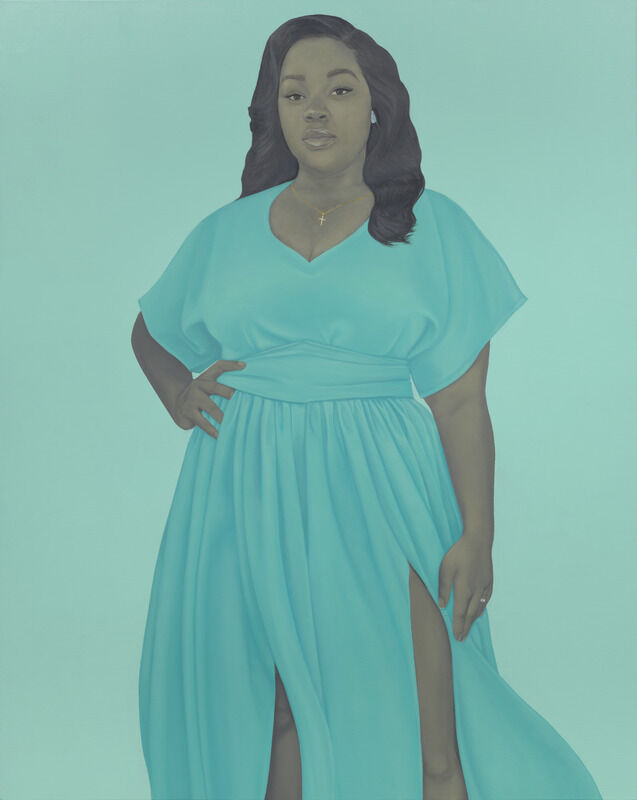
To clarify for our readers, Coates was the guest editor for that particular issue of Vanity Fair, and so that makes a difference, for sure. Now that the portrait is part of this exhibition at The Whitney, what has been the broader response to it?
A lot of people, of all races, are moved to tears by it. After I first finished it, I was really just thinking about how I’ve made this portrait, we’ve photographed it, it’s been on the cover of Vanity Fair, and now it’s in my studio. Now what can it do? I started some conversations, and it ended up being acquired by the National Museum of African American History and Culture. And now there’s a Breonna Taylor Legacy Fellowship and Breonna Taylor Legacy Scholarships for undergraduate students and law school students [at the University of Louisville, in Louisville, Kentucky, where Taylor lived; the fellowships are funded by proceeds from the portrait’s sale]. So if a student is doing anything in regards to social justice, whether their major is political science or art, they have an opportunity to get this scholarship. And then if a student is in law school and wants to work expungement [when a criminal record is erased or made unavailable for public access] cases in Alabama, which pays nothing, then here’s $12,000 to get you through your summer.
Does the idea that Black artists do work for each other resonate with you?
I feel like we make what we make because we are who we are. My mom told me this story about myself, and it stuck with me because I think my work sits in the world in the same way. [When I was a child] sometimes when we had dinner, I would just randomly get up and walk around the table and touch everybody on their shoulder and say, “I love you.” I would go all the way around, and then come sit down and finish my dinner. I think these portraits are “I love yous” out in the world to affirm anybody who is willing to see past the exterior and go deeper into their experience of what it means to be a human.
I love that story. And what do you experience when you look at your work?
I feel like the work sits in The Whitney, and there are words on the wall that explain it, but that work is me—somebody who was once a people pleaser and had a problem saying no, someone who doesn't like conflict or confrontation. My personality made that work.
I would never have looked at your work and thought, “These pieces were made by someone who had a problem saying no.” Are there specific things in the pieces that signal that to you?
I guess that’s where the beauty comes from, because the work doesn’t yell at you. It speaks to you nicely. If you feel uncomfortable in the presence of a Black person, this work will make you think, “Okay, well, maybe I don’t need to grab my purse. I might feel safe in the elevator with this guy.” It speaks to people that way. I went to Catholic school from K through 12, and was always one of two or three Black kids, so I have a lot of patience. I learned a lot of, “Let me explain to you why you can't say that.” Versus my friends that went to all-Black high schools, where it’s just like [gestures taking her earrings off], “Let me tell you…”
But you feel differently now, right? You’re in a different place. How do you think that will affect your work moving forward?
I’m not sure how the work is going to evolve to match who I am now, which is somebody who’s stronger, who doesn't mind saying no, and will look at you while you feel uncomfortable with my answer. I am excited because everything that I’ve made in this show has been living in my head for 20 years.
Does it feel like a kind of excavation in that way?
It feels more like a birth than an excavation. When I think about Black American art history and just our legacy within the larger canon, I feel like we don’t or can’t function on the same timeline as everybody else. It still feels like the beginning of something, this moment of myself, Rashid Johnson, Lorna Simpson, and Jack Whitten [all currently having museum shows]. It feels really great despite everything that’s happening. The art world is representing the world that we want to be—the real world right now.
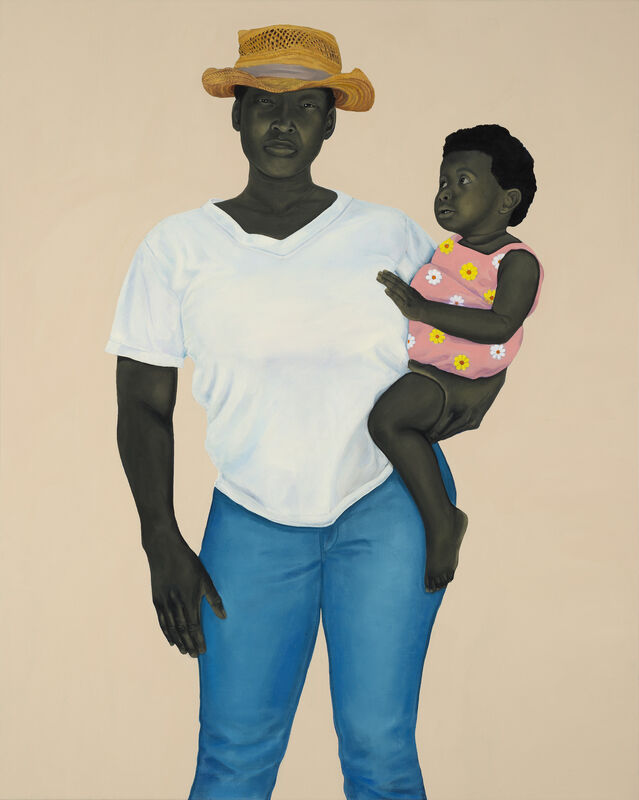
What happens next for you?
I’m hoping that this show will make it into the National Portrait Gallery without having to make any compromises based on who’s sitting in an office at the White House. And I don’t mean, “Well, if I can’t have this painting of two men kissing and a trans person, then I’m not going to do the show.” I feel like that would be a mistake. I feel like it’s a mistake to step down from boards just because [Trump] wants to take over the Kennedy Center. Now more than ever, I feel like it’s important we be in those rooms and not shutting down the conversation. I think the bigger moment would be the work being in the Smithsonian Institution and people coming there to look at American history and Presidents, and then walking into my exhibition.
Whatever the fate of the work in this show, one of the things that really came through as I was walking through the exhibit, just like the way you used to walk around your family’s dinner table and tell everybody you love them—all of these people are taking care of each other, and I felt tapped on the shoulder and loved by every one of them.
Exactly as you should have felt.
Why Is Consent Controversial?
 April 24, 2025 Howdy, Meteor readers, I know everyone is talking about Sinners, but I am what you would call a certified scaredy-cat; I still suffer from Scream. But a bunch of fellow scaredies online say it’s not too bad if you watch it during the day so I’ll see y’all at the afternoon matinee.  In today’s newsletter, we investigate sex miseducation in Indiana. Plus, Nona Willis Aronowitz remembers her “feminist fairy godmother.” Meow, Shannon Melero  WHAT'S GOING ONVirginity education: Yesterday, Indiana’s House and Senate voted in favor of SB 442, titled “Instruction on Human Sexuality.” You might have heard of it (on our Instagram feed and elsewhere) because of a debate over whether that “instruction” should include the idea of consent. The bill’s author, Sen. Gary Byrne (R-IN), had removed a requirement that teachers address consent earlier this week, arguing that the subject could be seen as “controversial.” (Research from the Indiana Department of Health shows that 56 percent of sexually active high schoolers had experienced some form of sexual violence, with 11th grade girls making up most of that group.) After public outcry, though, the consent requirement was re-added to the bill yesterday—your latest reminder that yelling works. But here’s the thing: The bill is still light on the education part of sex education. In addition to consent, it requires sex-ed classes in Indiana to teach four things: abstinence, abstinence (yes it’s listed twice), instruction that the best way to avoid STIs is a “mutually faithful monogamous relationship in the context of marriage” (we remind you, these are children and teens), and the viewing of a high-definition ultrasound video, at least three minutes long, depicting the development of organs in a fetus. It’s giving Catholic-school health class, and I would know, as someone whose sex-ed was having to watch the movie Riding in Cars with Boys. Let’s linger on the video for a second. These kinds of videos—most notably the notorious “Baby Olivia”—have cropped up over the last two years as a tool of the anti-abortion movement and are more often than not, medically inaccurate and meant to elicit an emotional response rather than be strictly educational. When pressed about the video requirements by Democratic senators yesterday, Byrne insisted he was not specifically suggesting “Baby Olivia,” IndyStar reported, and that school boards would be able to choose which films get shown to students. “There’s plenty of examples of videos,” he argued. (When pressed to name them, he could not.) Indiana is, of course, not the first state to introduce such narrow requirements for sex-ed classes or to inject what sound like conservative Christian views of sex into a secular public school system. Currently, 37 states have laws that require abstinence as part of sex education, while only 18 require teachers to share information about birth control. As far as education around consent? Only 12 states—13 if the Indiana bill passes—require that it be mentioned. But studies show that simply telling teenagers not to have sex doesn’t protect them from STIs or unwanted pregnancies. What does work, according to the Sexuality Information and Education Council of the United States, is comprehensive education that includes consent, contraception, STI prevention, and sexual health for LGBTQ+ communities. AND:
 OBAMA AT A LIVE TAPING FOR HER PODCAST, "IMO." IN HER LEFT HAND, SHE CAN BE SEEN HOLDING ALL OF HER DESIRE TO CONTINUE BEING A PEOPLE PLEASER. (VIA GETTY IMAGES)
 DURBIN IN 1994. (VIA GETTY IMAGES)  WEEKEND READING 📚Online: When we said we wanted a “womanosphere” this is not what we meant. (The Guardian) On history repeating itself: Historian Greg Grandin explores Latin America’s journey from “fighting to facilitating fascism.” (Democracy Now) On mixtapes: Have a cry with writer Jill Mapes, her dad, and a shared appreciation for good music. (Hearing Things)  FOLLOW THE METEOR Thank you for reading The Meteor! Got this from a friend?
|
![]()
You Can't Pay Us to Have More Kids
 April 22, 2025 Greetings, Meteor readers, It’s Earth Day! And also, it’s Taurus season! May we all feel some stabilizing, comforting energy over the next few weeks because boy, do we need it. In today’s newsletter, Nona Willis Aronowitz explains what’s behind the administration’s “make more babies” plan. Plus, we bid farewell to the pope. Bulls up, Shannon Melero  WHAT'S GOING ONBaby bust: Yesterday, the New York Times reported that the pro-natalist Trump administration, concerned about the U.S.’s falling birth rate, has been brainstorming ways to get American women to have more children. Some of their ideas include five-thousand-dollar baby bonuses, menstrual-cycle education, and a National Medal of Motherhood (a tactic you might recognize from the Nazis). Notably missing: plans to subsidize childcare, parental leave, or any other crucial improvements actual families have been requesting for generations. Lots of incredulous reactions across the internet made that exact point: “How can you expect us to have more babies without a strong social safety net?” As someone who yearns for free daycare and paid maternity leave, I’m tempted to say the same. Yes, it’s darkly ironic that the Trump administration is calling for more babies even as it has made deep cuts to maternal and child health and opposed any repair of the U.S.’s woefully inadequate family policies. But the thing is, offering benefits to families doesn’t actually boost birth rates. In fact, many countries that provide robust support for parents, like Finland, Norway, and Germany, have birth rates below ours. There’s no evidence that Trump’s proposed policies would work, either. “Even the richest, savviest, most committed governments” are stumped, a history professor told Vox in 2023. “If such policies were discoverable, I think someone would have discovered them.” So the question you’re probably wondering is: What’s so bad about the birth rate falling? Most countries in the world are now below the “replacement rate” of 2.1, and the trend is most pronounced in the richest nations; the United States is at about 1.6, a drop of more than 20 percent in the last decade. Seen one way, fewer babies is a success story of women truly having control over their own lives, and—thanks to contraception access, education, and career opportunities—being able to make choices that may or may not involve children. Maybe those decisions “shouldn’t scare us,” writes feminist writer Jill Filipovic, “but should inform us that when women have more options and opportunities, women’s desires become far more varied.” Still, experts across the political spectrum agree that a shrinking population with more old people than young presents huge economic and humanitarian challenges. An aging society means fewer workers to keep society functioning—to grow our food, to build our houses, to care for the elderly. For many, the story of South Korea, which has the lowest birth rate in the world, provides a disconcerting glimpse of what happens when so few babies are born: 1 in 5 people in South Korea are over 65, and nearly 40 percent of those elders live in poverty. But no matter how valid these concerns are, Trump’s “solutions” are both demeaning (ugh, that medal) and historically familiar: The one way governments have temporarily bumped up birth rates throughout history is by oppressing women. Think Nazi Germany and its Lebensborn program, which used women as incubators for 20,000 “Aryan” babies. Or Ceausescu's Romania, which severely restricted abortion and birth control access to devastating effect. Even our own “baby boom” in the repressive 1950s partially relied on pushing women into domesticity. This brand of pro-natalism—promoted by people like J.D. Vance, Tucker Carlson, and Elon Musk—often goes hand-in-hand with racism and anti-immigrant sentiment. While immigration is often touted as a short-term solution to the U.S.’s low birth rate, the Trump administration’s cocktail of natalism and xenophobia makes clear that they don’t want more babies of all kinds, just white, Christian babies in heterosexual nuclear families. So, yes, I agree that we should seriously grapple with how to reshape society in the face of population decline. I just don’t trust this administration—with its blatant disregard for families and basic human decency—to do it. —Nona Willis Aronowitz AND:
 POPE FRANCIS DELIVERED HIS FINAL EASTER SERMON AT THE VATICAN THE DAY BEFORE HE DIED. VIA GETTY IMAGES
 COLUMBIA STUDENTS AND ALUMNI CHAINED THEMSELVES TO THE UNIVERSITY'S MAIN GATE LAST WEEK TO PROTEST THE DETENTION OF STUDENTS. (VIA GETTY IMAGES)
 FOLLOW THE METEOR Thank you for reading The Meteor! Got this from a friend?
|
![]()


